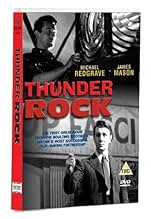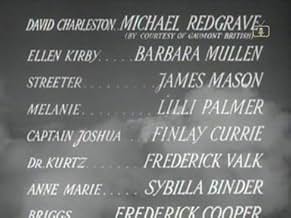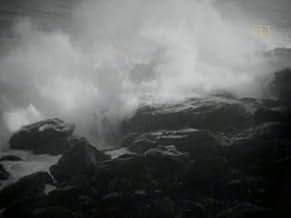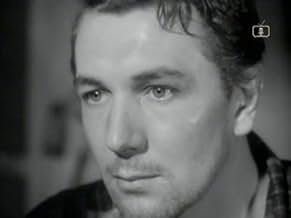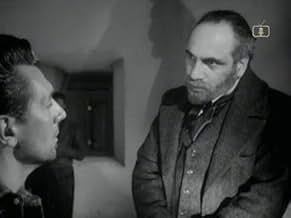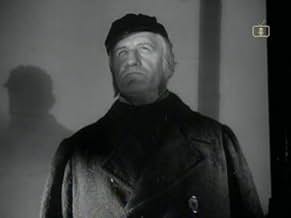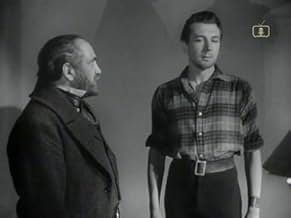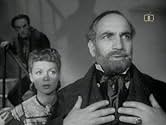IMDb RATING
6.5/10
857
YOUR RATING
Cynical, embittered newspaperman David Charleston (Michael Redgrave) is tormented, then inspired, by visions he keeps having of people who have drowned.Cynical, embittered newspaperman David Charleston (Michael Redgrave) is tormented, then inspired, by visions he keeps having of people who have drowned.Cynical, embittered newspaperman David Charleston (Michael Redgrave) is tormented, then inspired, by visions he keeps having of people who have drowned.
- Awards
- 1 win total
Bryan Herbert
- Flanning
- (as Brian Herbert)
Featured reviews
I saw this movie in 1942, when I worked for the War Department and had just enlisted in the Army Air Corps, so this might account for the strong memories I have of it.
I was a little shocked that it seemed almost pure propaganda. However, it was clearly made for a British audience at a time when the nation was in imminent danger of invasion by the Nazis. Its message was never to give up hope.
It opens with the hero being frightened by the spread of Fascism across Europe. He goes into a London movie house where the depressing newsreel is followed by a cartoon which the unthinking audience finds hilarious. Disgusted, he gives up and withdraws into himself. He becomes a sort of hermit and somehow gets a job as a lighthouse-keeper on the Great Lakes.
Browsing through the lighthouse's log, he finds an account of a shipwreck. As he reads, the viewer notices that the lighthouse's central pole is now at an angle--a very clever hint of the transition to the fantasy now taking place. He is now on board the sinking ship and all is confusion and despair. But it turns out OK--the first example of the message (to the English) not to give up hope.
There are several other such episodes including one about the doctor in Vienna who discovers that doctors not washing their hands is how the deadly childbirth fever infection is spread. A failure, he is laughed out of town. But a few years later his radical theory is proved correct. Another morale boost for the discouraged wartime English.
I can't remember how the movie ends--but I've never forgotten the movie!
I was a little shocked that it seemed almost pure propaganda. However, it was clearly made for a British audience at a time when the nation was in imminent danger of invasion by the Nazis. Its message was never to give up hope.
It opens with the hero being frightened by the spread of Fascism across Europe. He goes into a London movie house where the depressing newsreel is followed by a cartoon which the unthinking audience finds hilarious. Disgusted, he gives up and withdraws into himself. He becomes a sort of hermit and somehow gets a job as a lighthouse-keeper on the Great Lakes.
Browsing through the lighthouse's log, he finds an account of a shipwreck. As he reads, the viewer notices that the lighthouse's central pole is now at an angle--a very clever hint of the transition to the fantasy now taking place. He is now on board the sinking ship and all is confusion and despair. But it turns out OK--the first example of the message (to the English) not to give up hope.
There are several other such episodes including one about the doctor in Vienna who discovers that doctors not washing their hands is how the deadly childbirth fever infection is spread. A failure, he is laughed out of town. But a few years later his radical theory is proved correct. Another morale boost for the discouraged wartime English.
I can't remember how the movie ends--but I've never forgotten the movie!
When the authorities discover a lighthouse keeper is not cashing his paychecks, they go to visit him to make sure he is OK. One of the visitors gets into a chat with the lighthouse keeper, David Charleston and discovers that his desire to stay in the lighthouse is based on the fact that he is in contact with the ghosts from a ship that sunk many years ago; although the ghosts do not know they are dead. Charleston hides away - having been frustrated by those in power ignoring his warnings about fascism. However he finds that each passenger has had similar experiences that he, with the benefit of future knowledge, can learn from.
The point of this film is both obvious but also too obscure. The message of not giving up is laboured at the end, but for the majority of the film, it is hidden and damages the early meaning of the film. The pre-war setting is a morale boosting tale of sticking at it - for we never know what tomorrow will bring; it delivers a reasonable tale but I found it hard to get into the stories of the various passengers as they were not characters I was given a lot of time to get into and care about. The stuff with Charleston himself works better as I cared about him due to the time spent with him.
The film is very stagy however, it doesn't really flow very well at times and the best scenes are played out as if in a theatre. It is rather heavy at times but it still works if you know what to expect. The cast is OK but really it is all Redgrave's film. He exaggerates his performance as if he is on a stage and needing to project to the back row, but he is still very good. Mason has a minor role but always has such a good presence that it is hard to fault him. The support cast of passengers is less assured and really never get close to being real people - instead their dialogue and stories are too heavily laden with meaning.
Overall this is a reasonably good propaganda. It has more meaning and human pathos than most WWII propaganda films as it is not anti-enemy but pro-spirit and persistence. It may all be a little heavy and too stagy but it is enjoyable if you can do enough to get past the heavy message and some overly worthy acting.
The point of this film is both obvious but also too obscure. The message of not giving up is laboured at the end, but for the majority of the film, it is hidden and damages the early meaning of the film. The pre-war setting is a morale boosting tale of sticking at it - for we never know what tomorrow will bring; it delivers a reasonable tale but I found it hard to get into the stories of the various passengers as they were not characters I was given a lot of time to get into and care about. The stuff with Charleston himself works better as I cared about him due to the time spent with him.
The film is very stagy however, it doesn't really flow very well at times and the best scenes are played out as if in a theatre. It is rather heavy at times but it still works if you know what to expect. The cast is OK but really it is all Redgrave's film. He exaggerates his performance as if he is on a stage and needing to project to the back row, but he is still very good. Mason has a minor role but always has such a good presence that it is hard to fault him. The support cast of passengers is less assured and really never get close to being real people - instead their dialogue and stories are too heavily laden with meaning.
Overall this is a reasonably good propaganda. It has more meaning and human pathos than most WWII propaganda films as it is not anti-enemy but pro-spirit and persistence. It may all be a little heavy and too stagy but it is enjoyable if you can do enough to get past the heavy message and some overly worthy acting.
Based on a play, "Thunder Rock" is a 1942 film that follows the fascination with ghosts that seems prevalent at the time, just as it is prevalent in ours. There was "Between Two Worlds," which was the remake of "Outward Bound," "The Ghost and Mrs. Muir," "Heaven Can Wait," "Here Comes Mr. Jordan," - etc.! I won't go into the angels - "It's a Wonderful Life," "The Bishop's Wife," etc. The war caused people to think about death and the afterlife a great deal.
"Thunder Rock" is about a newspaperman David Charleston, (Michael Redgrave) who saw the rise of Fascism and Nazism and tried to warn people to wake up and take action. Unfortunately, his editors wouldn't allow the doom and gloom. His response is to give up and take a job as a lighthouse keeper on Thunder Rock in Lake Michigan. There, he becomes interested in a ship's log of a ship that went down 90 years earlier. He begins to have conversations with them in his mind. None of the passengers know they're dead except for the captain (Finlay Currie). He shows David how each of these people came to be on the ship. There's a doctor driven out of Vienna for using an early form of anesthesia (Frederick Valk), an early feminist (Beverly Mullen) jailed repeatedly for her views, a man and his wife en route to America to try for a better life for their family.
There are several themes present in this film - the themes of keeping hope, not giving up one's quest, and affirming life, certainly important ideas in a time of war. There's also the theme of reincarnation, as one of these people could have been Charleston. In the beginning of the film, there is the communication of information from one person to another to another to another, as knowledge is passed through generations.
Redgrave is excellent, as are Finlay Currie, Beverly Mullen, James Mason (as David's friend) and a young Lili Palmer as the doctor's daughter. In fact, the whole cast is good, including a young Barry Morse in his pre-"The Fugitive" days, as the ex-fiancée of Beverly Mullen.
Beautifully photographed and thought-provoking.
"Thunder Rock" is about a newspaperman David Charleston, (Michael Redgrave) who saw the rise of Fascism and Nazism and tried to warn people to wake up and take action. Unfortunately, his editors wouldn't allow the doom and gloom. His response is to give up and take a job as a lighthouse keeper on Thunder Rock in Lake Michigan. There, he becomes interested in a ship's log of a ship that went down 90 years earlier. He begins to have conversations with them in his mind. None of the passengers know they're dead except for the captain (Finlay Currie). He shows David how each of these people came to be on the ship. There's a doctor driven out of Vienna for using an early form of anesthesia (Frederick Valk), an early feminist (Beverly Mullen) jailed repeatedly for her views, a man and his wife en route to America to try for a better life for their family.
There are several themes present in this film - the themes of keeping hope, not giving up one's quest, and affirming life, certainly important ideas in a time of war. There's also the theme of reincarnation, as one of these people could have been Charleston. In the beginning of the film, there is the communication of information from one person to another to another to another, as knowledge is passed through generations.
Redgrave is excellent, as are Finlay Currie, Beverly Mullen, James Mason (as David's friend) and a young Lili Palmer as the doctor's daughter. In fact, the whole cast is good, including a young Barry Morse in his pre-"The Fugitive" days, as the ex-fiancée of Beverly Mullen.
Beautifully photographed and thought-provoking.
DON'T GIVE UP, 'CAUSE YOU HAVE FRIENDS
Even if, in as this clever psychological drama about disillusionment the friends are inside your head.
DON'T GIVE UP, YOU'RE NOT BEATEN YET. Even if you've withdrawn from the real world because you think it's a terrible place and despite you trying all your life to make it better you now think it's a place without hope.
DON'T GIVE UP, I KNOW YOU CAN MAKE IT GOOD. Those imaginary people telling you that you can make a difference aren't strangers, they're yourself.
This could have been a dry worthy call to arms but instead it's a clever grown up and uplifting celebration of humanity. It's lively, fast moving and emotionally moving.
DON'T GIVE UP, YOU'RE NOT BEATEN YET. Even if you've withdrawn from the real world because you think it's a terrible place and despite you trying all your life to make it better you now think it's a place without hope.
DON'T GIVE UP, I KNOW YOU CAN MAKE IT GOOD. Those imaginary people telling you that you can make a difference aren't strangers, they're yourself.
This could have been a dry worthy call to arms but instead it's a clever grown up and uplifting celebration of humanity. It's lively, fast moving and emotionally moving.
That this story is an allegory is clear from very early on but the director seems to have wanted to disguise it somehow with unnecessary padding. In doing so he detracts from the overall message and loses his audience a little along the way. Take the opening scenes as an example where a phone call is passed higher and higher through a chain of employees. It's well played, well acted and amusing and of absolutely no relevence whatsoever to the plot. You may as well have had a Donald Duck Cartoon instead and started the film where James Mason lands at the lighthouse.
It achieves some great moments both in and out of it's lighthouse setting, Michael Redgrave is very good but everything just goes on that little bit too long for it's own good.
James Mason stardom puts him near the top of the billing, but he's really only a bit player in this and doesn't make any significant contribution to the overall film.
It achieves some great moments both in and out of it's lighthouse setting, Michael Redgrave is very good but everything just goes on that little bit too long for it's own good.
James Mason stardom puts him near the top of the billing, but he's really only a bit player in this and doesn't make any significant contribution to the overall film.
Did you know
- TriviaBarbara Mullen (Ellen Kirby) was playing a forty-year-old spinster, yet, she was only twenty-eight.
- GoofsDuring the flashback sequence, when "Briggs" walks back into the room to his family, a crew member's hand can be seen outside the door stopping it from slamming shut.
- ConnectionsReferenced in Le portrait de Jennie (1948)
Details
- Release date
- Country of origin
- Language
- Also known as
- Thunder Rock
- Filming locations
- D&P Studios, Denham, Uxbridge, Buckinghamshire, England, UK(studio: made at D & P Studios Denham - England)
- Production company
- See more company credits at IMDbPro
- Runtime
- 1h 52m(112 min)
- Color
- Aspect ratio
- 1.37 : 1
Contribute to this page
Suggest an edit or add missing content

